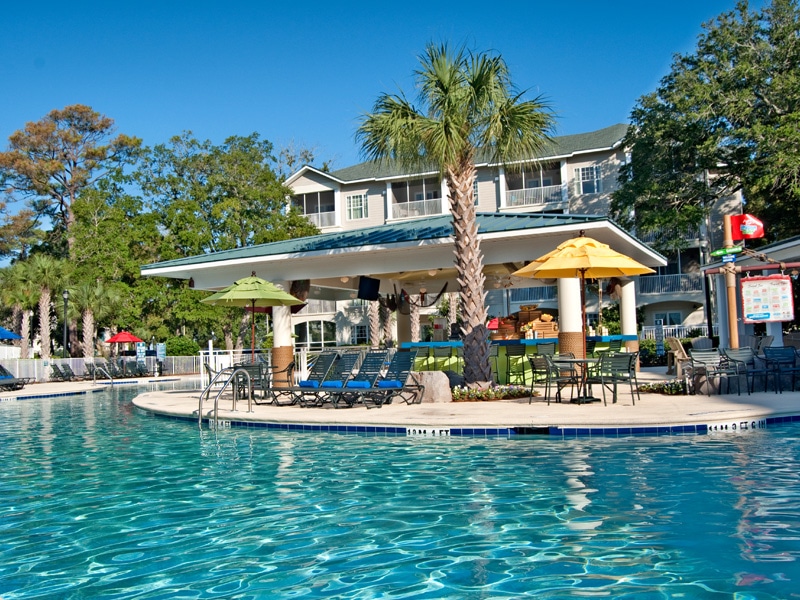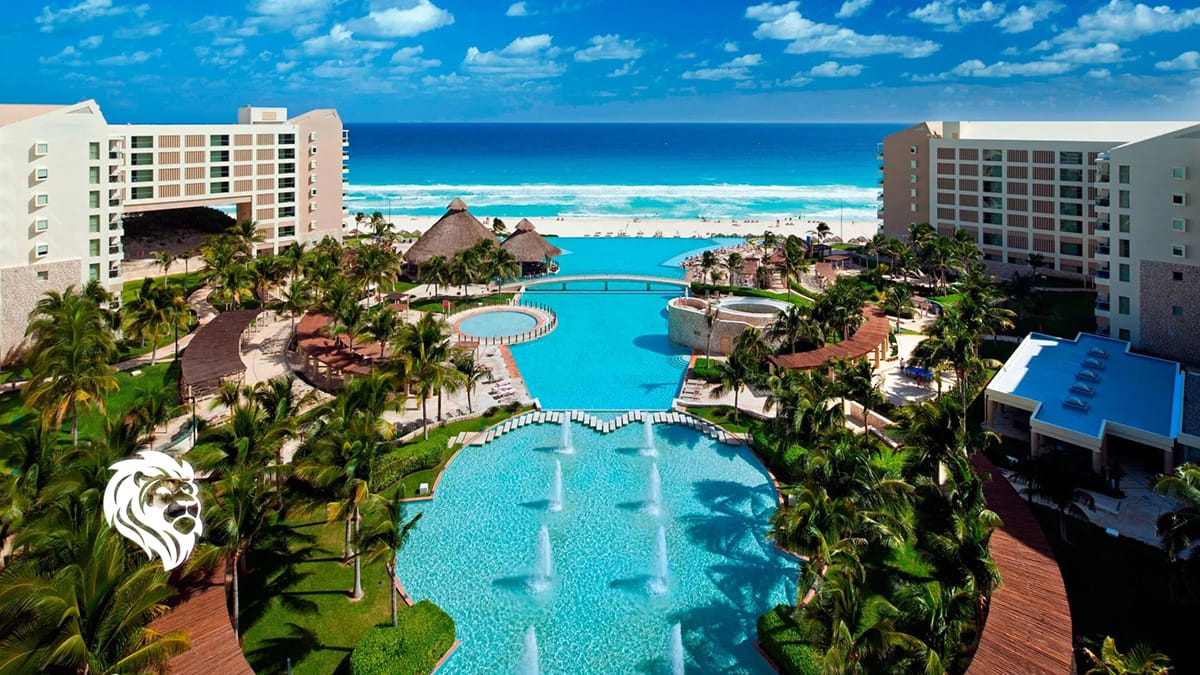Who doesn’t want the best value out of their vacation? Whether it’s transportation, food, or destinations, everyone wants what’s best for their trip. Of course, this also applies when it comes to finding a place to stay. The conversation surrounding the benefits of timeshare vs hotel is always ongoing, and the pros and cons of each really depend on the individual or family. Vacation styles, budget, location, frequency of travel, and length of stay are all important factors to consider. In this showdown, we weigh the difference between timeshare vs hotel when it comes to these major factors.
- Benefits of Timeshare
- What is a Timeshare?
- Timeshare Vs Hotel
- In-Unit Kitchens and Dining
- Amenities
- Vacation Exchange
- Timeshare Suite Vs Hotel Room Size
- Cost of Timeshare Vs Hotel
- Types of Timeshare Ownership Compared to Hotels
- Timeshare vs. Vacation Club: What Sets Them Apart?
- What Is a Deeded Timeshare?
- What is a Right-To-Use Timeshare?
- What is a Leasehold Timeshare?
- Timeshare vs Hotel: Locations and Flexibility
- Planning Your Next Trip?
Benefits of Timeshare
What exactly are the benefits of a timeshare compared to a hotel? For one, planning for vacations can be difficult, which is where a timeshare can come in handy. Vacation ownership can save you money! If you already have your lodging sorted out, then you can budget for the rest of your vacation needs. You can focus on saving for flights, vacation activities, and more. Plus, with that extra money in your pocket, you can plan on fully stocking the kitchen in your timeshare suite! So, how do you decide when it comes to timeshare versus a hotel? Weighing the pros and cons of timeshares and hotels is a great place to start.
What is a Timeshare?
Before we dive deeper, let’s clarify what a timeshare actually is. A timeshare—sometimes called vacation ownership—is a vacation property or resort unit that you have the right to use for a certain amount of time each year. Most commonly, owners get a week per year, but the exact time can vary depending on the developer or resort. Major brands like Hilton Grand Vacations, Marriott Vacation Club, and Wyndham Destinations are well-known for offering these types of vacation experiences.
It’s also important to note that timeshare ownership comes with annual maintenance fees. These fees help keep the property clean, updated, and running smoothly—much like a homeowners association fee, but for your vacation home.
Timeshare Vs Hotel
The benefits of timeshare resorts and the accommodations they offer are the spacious, home-like units. Complete with multiple bedrooms, living areas, and complete kitchens; timeshares give owners a home away from home. What’s more, many timeshares encompass everything you could want in a vacation. With all of the incredible amenities, you might not even want to leave your resort.
In-Unit Kitchens and Dining



Unlike a hotel, timeshares have full-size kitchens, not just a microwave and mini-fridge. This is a big factor for families considering a timeshare over a hotel. If you’re just looking for a complimentary breakfast on your way out the door, maybe a hotel would be okay for you. Foodies might love exploring every dining option in the areas surrounding their hotel or resort, but sometimes a home-cooked meal just can’t be beaten. Especially when you’re traveling with a large family! Cooking in your timeshare’s kitchen some nights can be very helpful with staying within your budget.
Amenities
One of the pros of timeshare resorts that is often one of the cons of hotels is access to extensive amenities. Timeshares are designed with luxury and excitement in mind, so many have:
- Spas
- Multiple swimming pools, water features, lazy rivers, water slides, etc!
- Amusement parks
- Golf courses
- Excursions
- Snow-skiing and water-skiing access
- Casinos
- Boating
- Restaurants
- Bars and pool-side bars
Vacation Exchange

A great thing about owning a timeshare is the chance to become a vacation exchange member. RCI (formerly Resort Condominiums International) and Interval International are two of the largest exchange companies for timeshares out there. Vacation exchange is as simple as signing up for a membership, depositing your week or points, and then swapping for a new location/week. You don’t get access to this type of vacation exchange with hotels.
Learn more: Interval International: All You Need to Know
Timeshare Suite Vs Hotel Room Size
As we mentioned before, timeshares come with large kitchens and living spaces. Those accommodations that come with timeshares shouldn’t be downplayed. Imagine a standard hotel room. Typically you’ll have a bed, a TV, a bathroom, and maybe a small table. Now, imagine your timeshare suite being three times larger than that! On average, that’s how much larger a timeshare suite is.
Additionally, you can enjoy separate locking bedrooms for extra privacy and relaxation, which is a huge benefit of timeshares. Not to mention, you won’t have to worry about over-packing–timeshares often come with washers and dryers in your room so you can wash all of your clothes like you would at home. This is one of the major pros of timeshares and cons of hotels, especially if you have a family.
Cost of Timeshare Vs Hotel
One of the biggest benefits of timeshares is that they can save families money. If you’re able to find a timeshare you love on the resale market, this becomes even more so. Many timeshare resales are priced lower than they are from a developer. With a timeshare, you can guarantee your family vacations for years to come. While timeshare is not an investment, if you buy a timeshare outright, you’ll only then have to pay maintenance fees every year. Not to mention, there are timeshare financing options available to you.
Another key point to consider is the way timeshares help you lock in vacation costs. Hotel rates tend to rise year after year, which can make family travel more expensive over time. With a timeshare, you’re essentially securing tomorrow’s vacations at today’s prices—giving you greater control over your travel budget long-term. And, while some people think of timeshares as a luxury, the resale market actually makes it easy to find options that fit a wide range of budgets. This can make regular, memorable getaways more accessible for families without worrying about the unpredictability of hotel pricing.
Types of Timeshare Ownership Compared to Hotels
When deciding between a timeshare and a traditional hotel stay, it helps to understand the various types of timeshare ownership available. While hotels typically offer a straightforward, pay-per-night arrangement—usually with just a single room and basic amenities—timeshares come in several formats, each with its own unique perks and considerations.
Deeded Timeshares
A deeded timeshare works much like traditional real estate. Owners receive a deed for a specific week (or weeks) at a resort, giving them legal ownership of the unit for that time period each year. This means you can sell, rent, or even pass down your timeshare to family. However, it’s important to remember that, unlike most real estate, the value of deeded timeshares rarely appreciates over time.
Right-to-Use Timeshares
With a right-to-use (RTU) timeshare, you don’t technically own the property. Instead, you hold a long-term lease—usually spanning several decades—that allows you to use the vacation home during an allotted time each year. Once the contract ends, the right to use the unit returns to the developer. Despite lacking a deed, these timeshares still offer flexibility, often allowing owners to exchange their weeks for stays in other destinations through vacation clubs.
Leasehold Timeshares
Leasehold timeshares operate on a fixed-term agreement. Much like a right-to-use arrangement, owners can enjoy the property for a set number of years before their contract expires. A well-known example of leasehold ownership can be found in programs like Disney Vacation Club, where the contract specifies an end date from the start.
How Timeshares Stack Up Against Hotels
While a hotel stay is perfect for a single getaway or spontaneous trip, timeshares are designed for those who prefer an annual vacation tradition, extra space, and the comforts of home. With multiple bedrooms, living areas, and resort-style amenities, timeshares offer a distinctly more home-like experience compared to standard hotel rooms.
Timeshare vs. Vacation Club: What Sets Them Apart?
So, what’s the real difference between a traditional timeshare and a vacation club? While both offer unique ways to secure great vacations year after year, the structure of ownership and flexibility each provides can shape your travel experiences in different ways.
Traditional Timeshares:
With a classic timeshare, you’re typically assigned a specific week (or a floating week during a certain season) at a single resort. This model is ideal for those who love the comfort of returning to the same familiar place, whether it’s beside the Cinderella Castle at Disney or along the sun-drenched coasts of Aruba. You’ll know exactly when—and where—you’re vacationing each year.
Vacation Clubs:
Vacation clubs, on the other hand, operate on a points-based system. Instead of owning one set week at one resort, you receive an annual allotment of points (think of them as travel currency). You can use those points to choose from many destinations, resort types, and dates within the club’s portfolio. This is perfect for travelers wanting flexibility—maybe one year you’re exploring the slopes out West with Marriott Vacation Club, and the next you’re relaxing by the pool at a Holiday Inn Club Vacations property. Flexibility is the key perk here.
In a nutshell:
- Timeshares = Consistency and routine; a fixed (or semi-flexible) week at a familiar resort.
- Vacation Clubs = Variety and adaptability; points to spend at multiple locations, whenever you want to travel.
Both approaches help you lock in future vacations, but how you travel—and where—depends on the model you choose.
What Is a Deeded Timeshare?
A deeded timeshare is a type of vacation ownership where you actually receive a real estate deed for a specific week at a resort—just like owning a piece of property. This ownership means you can use your allotted week each year, but you also have the flexibility to rent it out, gift it, or even sell it if your travel plans change. Since you hold an actual deed, you’re not just “borrowing” time; you have a real, transferable asset (albeit one that typically doesn’t increase in value over time like traditional real estate).
One thing to remember: unlike your dreamy beachfront cottage investment, most deeded timeshares don’t appreciate. If you decide to sell, it’s best to be realistic about the resale market, knowing you probably won’t recoup your original cost. However, the long-term perks—regular vacation accommodations and the potential to offset annual dues by renting out your week—can make deeded ownership appealing for frequent travelers.
What is a Right-To-Use Timeshare?
If you’ve come across the term “right-to-use timeshare” and scratched your head, you’re not alone! Unlike traditional deeded timeshares, which often function much like real estate ownership, a right-to-use (RTU) timeshare is a little different. Instead of owning a physical piece of the property, you’re essentially leasing the right to use a resort or vacation unit for a set number of years.
Here’s how it works:
- No Deed, Just a Lease: With RTU timeshares, there’s no deed or title—your contract spells out exactly how long you may vacation there.
- Fixed Terms: These agreements typically last anywhere from 30 to 99 years, depending on the developer (think Club Wyndham or Hilton Grand Vacations). When your term is up, your right to stay ends as well.
- Buy, Sell, or Gift: While you don’t own the property itself, in many cases you can sell or transfer your right-to-use to someone else through the resale market.
This structure makes RTU timeshares a flexible option—perfect for travelers who love returning to the same favorite spot, but don’t want the ongoing commitment of traditional ownership. This flexibility is especially popular with international destinations, where property laws can make deeded timeshare ownership tricky or even impossible.
What is a Leasehold Timeshare?
A leasehold timeshare is a type of vacation ownership where you have the right to use a resort property for a set period of years, rather than owning it forever. Unlike a traditional deeded timeshare, which you can pass on indefinitely, leasehold agreements have a clear expiration date—think of it like leasing an apartment, but for your vacations.
During your lease term, you’ll enjoy all the classic perks of timeshare ownership, including access to the property’s amenities and your yearly or biennial stays. This setup is actually quite common with certain vacation clubs, such as Disney Vacation Club, which offers contracts that typically last 30 to 50 years. When the lease expires, the ownership rights return to the developer or resort, and your usage rights end.
Leasehold timeshares can be a great choice if you love a certain destination but aren’t interested in passing a property down for generations. They pack in all the vacation benefits you’d expect, just with a built-in exit plan for the future.
Timeshare vs Hotel: Locations and Flexibility
When you’re looking for the pros and cons of timeshare vs hotel, location is a huge factor! When you own a timeshare, you can choose where you want to vacation from hundreds of incredible resorts. This is especially true when you own with a vacation club. The best part of being a vacation club member is the flexibility and resort locations! Each year, you are able to decide which resort you want to visit! You don’t have to stay at your “home resort” each year! With a vacation club, like the ones below, you are able to experience new destinations every year while still experiencing the incredible perks of owning a timeshare!
Vacation Club Membership Perks and Considerations
Vacation club membership is one of the main differences between timeshares and traditional hotels. Memberships also offer unique benefits—owners can enjoy an extensive list of perks, such as priority booking, invitations to exclusive deals, and often discounted rates on merchandise and dining. These extras can make your vacation experience even more special, offering added value beyond the resort stay itself.
It’s worth noting that not all timeshare owners are automatically enrolled in a vacation club, as each brand has its own guidelines and requirements for membership. Becoming part of a vacation club typically means you’ll need to own a timeshare with that club and pay membership fees or club dues. These dues help cover the cost of managing multiple properties and maintaining the high standard of amenities and experiences.
However, the exclusive access to discounted rates for accommodations, excursions, and other special offers within the club’s network makes vacation club membership a standout choice for avid travelers. The flexibility to explore new destinations year after year, combined with these exclusive benefits, is a major reason why vacation clubs stand out compared to standard hotel stays.
Disney Vacation Club



Disney Vacation Club is a great choice for the entire family. Their resorts are all within close proximity to major vacation destinations across the country. More than ten of the DVC resorts are within minutes of Walt Disney World. There are shuttles, monorails, and gondolas to transport guests straight from their accommodations to the fun. There are also DVC resorts on some of the country’s best beaches! Disney’s Grand Riviera is great for anyone looking to stay in Orlando. Meanwhile, Disney’s Grand Californian offers a magical home away from home in Anaheim, California.
As you enter a DVC resort, you will be greeted by a cast member saying “welcome home!” Disney strives to make every DVC member feel right at home at their resorts and we think they really accomplish that goal. Disney Vacation Club members can submit an order form to have groceries delivered to their resort, giving you more time to spend with family and make memories. If you’d like to know more about Disney Vacation Club, check out our Youtube video below: “Is Disney Vacation Club Worth it?”
Marriott Vacation Club



Marriott Vacation Club is another top timeshare brand that offers beautiful resorts around the world. If you’re looking to stay in Orlando, you’re in luck! Marriott’s Cypress Harbor has that “Old Florida” charm about it, with gazebos, porches, and stunning pathways through the resort property. Close to all the attractions of Orlando, vacationers can also enjoy this resort, complete with full kitchens in every unit.
Marriott Vacation Club has over 50 resorts around the globe that have all of the incredible amenities that come with owning a timeshare. The difference between staying at a Marriott timeshare vs a Marriott hotel is accommodation size and sense of community. Being a Marriott Vacation Club member means that you can really experience the brand’s world-class hospitality all over the world!
Learn more: 9 Great Marriott Vacation Club Destinations
Holiday Inn Club Vacations



Holiday Inn Club Vacations is a great option for those looking to buy a timeshare. HICV focuses on family-friendly vacations in fun destinations. If you’re looking to head to the mountains, the Smoky Mountain Resort is a popular choice! With its indoor and outdoor pools, sauna, and easy access to the Smoky Mountains National Park, it’s clear to see why. Another great destination for family vacations is Williamsburg, Virginia, and Holiday Inn Club Vacations, Williamsburg Resort puts you right in the center of the fun! This resort sits right next to colonial Williamsburg, so guests are just minutes away from exciting outdoor activities. Plus, there are tons of other attractions, like Busch Gardens, just a short drive away from the resort.
Whether you want to have fun in the sun or go on an adventure in the mountains, Holiday Inn Club Vacations can provide the getaway of your dreams.
Learn more: Top Holiday Inn Club Vacations Destinations to Visit
Westgate



In every industry, there are brands associated with the highest level of quality. In the timeshare world, that honor belongs to Westgate. Everything about their resorts exudes style and class. From the elegant accommodations to the members-only events, this is a brand for anyone looking for even more luxury in their experience. If a trip to the Big Apple is your kind of vacation, stay at the Westgate New York Grand Central. This resort is close to many of the city’s best attractions like Times Square and the Rockefeller Center, so you’ll have no trouble getting into the action. Another great resort is the Westgate Las Vegas Resort and Casino. This resort embodies the idea “go big or go home” with massive suites that can accommodate up to 12 guests.
If you want a brand that really shows off the best timeshares offer vs hotels, visit a Westgate resort.
Learn more: 5 Best Westgate Resorts Owners Love
Planning Your Next Trip?
By now, you’ve seen the benefits of timeshares, but it’s up to you to decide whether vacation ownership is right for you. If you’ve decided you want to buy a timeshare, we’re happy to help! Our marketplace features listings from plenty of great developers like Disney Vacation Club, Marriott Vacation Club, Holiday Inn Club Vacations, Westgate, and more! If you have any questions about timeshares, feel free to give us a call at 1-800-410-8326 or email us at [email protected]. Our licensed agents are always happy to help! We also have a blog that covers a number of topics to keep you updated on all things timeshare.







